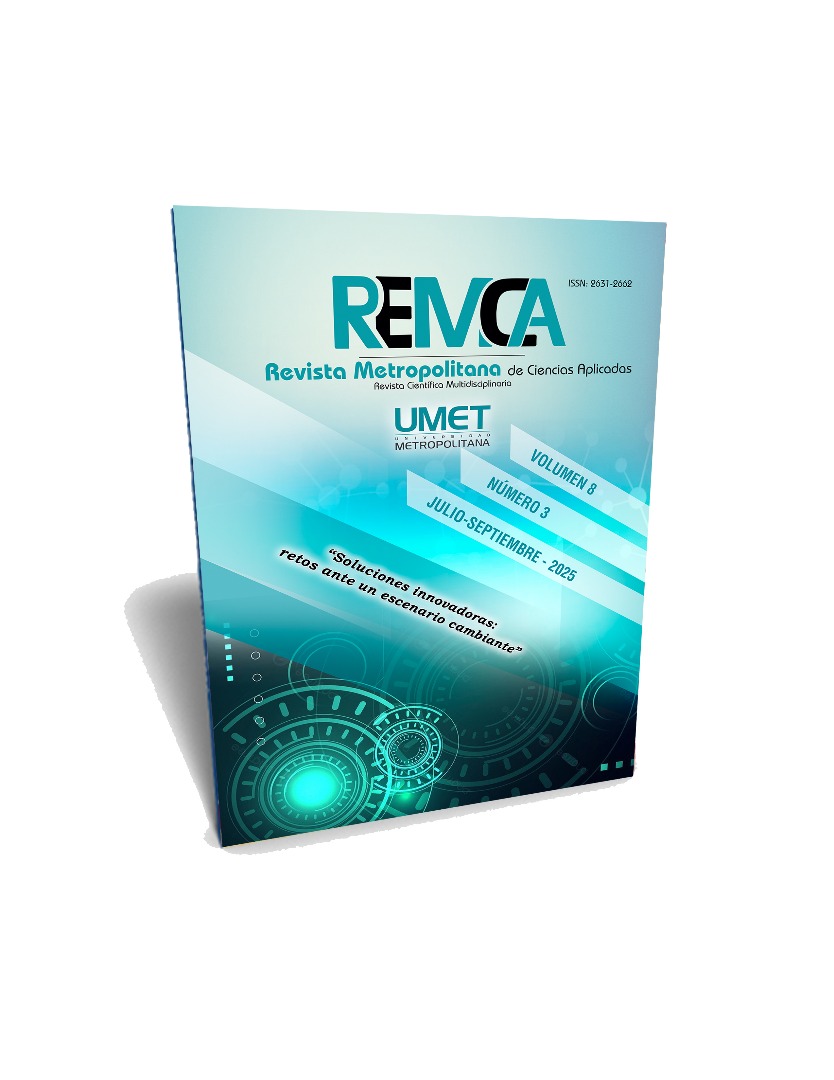Revisión de la desprotección de los derechos de las personas con Síndrome de Down
DOI:
https://doi.org/10.62452/wb5s8g31Palabras clave:
Síndrome de Down, vulneración de derechos, inclusión social, políticas públicasResumen
El objetivo de esta investigación fue analizar la vulneración de los derechos de las personas con síndrome de Down en el cantón Tulcán, identificando las barreras y desafíos que enfrentan, y evaluar la efectividad de las políticas públicas existentes. Para ello, se empleó un enfoque mixto, combinando métodos cualitativos y cuantitativos. Se realizaron entrevistas, grupos focales, encuestas estructuradas y revisión documental, con una muestra de personas con síndrome de Down, familiares, profesionales de la salud, educación, y funcionarios públicos. Los datos obtenidos fueron analizados mediante estadísticas descriptivas y análisis de contenido temático. Los resultados revelaron que los derechos más vulnerados son la igualdad de oportunidades en educación, empleo y salud, evidenciando una discriminación estructural que excluye a las personas con síndrome de Down. La investigación también destacó la falta de implementación efectiva de políticas públicas, a pesar de un marco normativo sólido, debido a la carencia de recursos y coordinación institucional. Las madres entrevistadas señalaron la falta de apoyo institucional y el rol esencial de la familia en la defensa de estos derechos. Las principales conclusiones sugieren que, para mejorar la inclusión, se requieren medidas concretas como la implementación efectiva de políticas públicas, la sensibilización social y el fortalecimiento de los programas de apoyo. Se recomienda aumentar los recursos destinados a la educación inclusiva y al acceso a servicios de salud adecuados para garantizar el pleno ejercicio de los derechos de las personas con síndrome de Down.
Descargas
Referencias
De Graaf, G., Buckley, F., & Skotko, B.G. (2021). Estimation of the number of people with Down syndrome in Europe. Eur J Hum Genet 29, 402–410 https://doi.org/10.1038/s41431-020-00748-y
Down España. (2021). Programa español de salud para personas con síndrome de Down. https://www.sindromedown.org/down-espana-presenta-su-nuevo-programa-de-salud-para-personas-con-sindrome-de-down/
Down España. (2023a). Día Mundial del Síndrome de Down: Campaña #TanComoTú. https://www.sindromedown.org/dia-mundial-sindrome-down/
Down España. (2023b). Empleo inclusivo: Empleo con apoyo. https://www.sindromedown.org/creamos-inclusion/empleo/empleo-inclusivo-empleo-con-apoyo/
Down España. (2023c). Guía para docentes: Entendiendo la educación inclusiva. https://asdown.org/wp-content/uploads/2023/09/Cartilla-4-Maestros.pdf
Down Málaga. (2021). La salud mental en las personas con síndrome de Down. https://downmalaga.com/la-salud-mental-en-las-personas-con-sindrome-de-down
Ecuador. Asamblea Nacional Constituyente. (2008). Constitución de la República del Ecuador. Registro Oficial 449. https://www.asambleanacional.gob.ec/es/contenido/constitucion-de-la-republica-del-ecuador-2008-reformada?
Ecuador. Consejo Nacional para la Igualdad de Discapacidades. (2008). Convención sobre los derechos de las personas con discapacidad. https://www.consejodiscapacidades.gob.ec/wp-content/uploads/downloads/2014/02/convencion_derechos_discapacidad.pdf
Ecuador. Consejo Nacional para la Igualdad de Discapacidades. (2012). Ley Orgánica de Discapacidades. https://www.consejodiscapacidades.gob.ec/wp-content/uploads/downloads/2014/02/ley_organica_discapacidades.pdf
Ecuador. Ministerio de Educación. (2017). Ley Orgánica de Educación Intercultural (LOEI) codificada. https://educacion.gob.ec/wp-content/uploads/downloads/2017/02/Ley_Organica_de_Educacion_Intercultural_LOEI_codificado.pdf
Ecuador. Ministerio de Educación. (2025). Educar Ecuador. https://educarecuador.gob.ec/
Ecuador. Ministerio de Inclusión Económica y Social. (2024). Bono Joaquín Gallegos Lara. https://www.gob.ec/mies/tramites/registro-solicitud-al-bono-joaquin-gallegos-lara
Gobierno de México. (2018). Indicadores de programas presupuestarios. https://www.gob.mx/conadis/articulos/indicadores-de-programas-presupuestarios-256199
Gobierno del Ecuador. (2017). Plan Nacional de Desarrollo 2017–2021 “Toda una Vida”. https://www.gob.ec/sites/default/files/regulations/2018-10/Plan%20Nacional%20de%20Desarrollo%20Toda%20Una%20Vida%202017%20-%202021.pdf
McGlinchey, E., Fortea, J., Vava, B., Andrews, Y., Ranchod, K., & Kleinhans, A. (2025). Raising awareness and addressing inequities for people with Down syndrome in South Africa. Int J Equity Health 24. https://doi.org/10.1186/s12939-024-02349-3
Organización de las Naciones Unidas para la Educación, la Ciencia y la Cultura. (2008). Por una educación para todos que sea inclusiva: ¿hacia dónde vamos? https://unesdoc.unesco.org/ark:/48223/pf0000178967_spa
Piedra Noriega, I. (2021). Padecimientos asociados al síndrome de Down. TecSalud Blog. https://blog.tecsalud.mx/padecimientos-asociados-al-sindrome-de-down
Varshney, K., Iriowen, R., Morrell, K., Pillay, P., Fossi, A., & Stephens, M. M. (2022). Disparities and outcomes of patients living with Down Syndrome undergoing healthcare transitions from pediatric to adult care: A scoping review. American Journal of Medical Genetics Part A, 188(8), 2293–2302. https://pubmed.ncbi.nlm.nih.gov/35686676/
Vicepresidencia de la República del Ecuador. (2007). Discurso presentación programa “Ecuador sin Barreras”. https://www.presidencia.gob.ec/wp-content/uploads/downloads/2013/09/2007-05-23-Discurso-presentaci%C3%B3n-programa-_Ecuador-sin-barreras_.pdf
Descargas
Publicado
Número
Sección
Licencia
Derechos de autor 2025 Pablo Alejandro Herrera-Herrera, Carmen Marina Méndez-Cabrita, Paolo Farid x Chapi-Álvarez (Autor/a)

Esta obra está bajo una licencia internacional Creative Commons Atribución-NoComercial-CompartirIgual 4.0.
Los autores que publican en la Revista Metropolitana de Ciencias Aplicadas (REMCA), están de acuerdo con los siguientes términos:
1. Derechos de Autor
Los autores conservan los derechos de autor sobre sus trabajos sin restricciones. Los autores otorgan a la revista el derecho de primera publicación. Para ello, ceden a la revista, de forma no exclusiva, los derechos de explotación (reproducción, distribución, comunicación pública y transformación). Los autores pueden establecer otros acuerdos adicionales para la distribución no exclusiva de la versión de la obra publicada en la revista, siempre que exista un reconocimiento de su publicación inicial en esta revista.
© Los autores.
2. Licencia
Los trabajos se publican en la revista bajo la licencia de Atribución-NoComercial-CompartirIgual 4.0 Internacional de Creative Commons (CC BY-NC-SA 4.0). Los términos se pueden consultar en: https://creativecommons.org/licenses/by-nc-sa/4.0/deed.es
Esta licencia permite:
- Compartir: copiar y redistribuir el material en cualquier medio o formato.
- Adaptar: remezclar, transformar y crear a partir del material.
Bajo los siguientes términos:
- Atribución: ha de reconocer la autoría de manera apropiada, proporcionar un enlace a la licencia e indicar si se ha hecho algún cambio. Puede hacerlo de cualquier manera razonable, pero no de forma tal que sugiera que el licenciador le da soporte o patrocina el uso que se hace.
- NoComercial: no puede utilizar el material para finalidades comerciales.
- CompartirIgual: si remezcla, transforma o crea a partir del material, debe difundir su creación con la misma licencia que la obra original.
No hay restricciones adicionales. No puede aplicar términos legales ni medidas tecnológicas que restrinjan legalmente a otros hacer cualquier cosa que la licencia permita.




